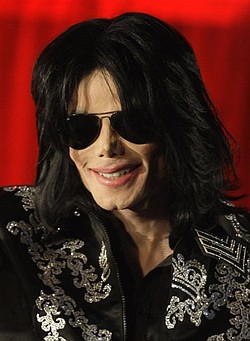Michael Jackson was a man of contradictions
FILE - In this March 5, 2009 file photo, US singer Michael Jackson is shown at a press conference in London, announcing plans to appear at the London O2 Arena in July. Jackson, 50, died in Los Angeles on Thursday, June 25, 2009. (AP Photo/Joel Ryan, file)
- More on Jackson's life and death
-
- VIDEO: Michael Jackson Remembered
- VINDY STORY: Trip down memory lane finds a personable, approachable star
- VINDY STORY: Valley fans hail Jackson's legacy
- VINDY STORY: Valley fans celebrate Jackson
- AP STORY: Jackson’s public memorial takes solemn, spiritual turn
- AP STORY: Jackson’s mom gets temporary custody
- AP STORY: At BET Awards, Jackson’s legacy honored
- AP STORY: Fans mourn ‘King of Pop’
- TIMELINE: The life of Michael Jackson
- PHOTOGALLERY: Michael Jackson Obituary Gallery
- VIDEO: Local hip-hop remembers MJ
- LINK: Michael Jackson iTunes Store (opens in iTunes app)
- LINK: Complete Bio and music selection
- LINK: Michael Jackson YouTube channel
- VINDY STORY: Good night Michael
- VINDY STORY: The Valley remembers megastar
- TIMELINE: Career highlights
By GLENN GAMBOA
NEW YORK — Michael Jackson always was a bundle of contradictions.
Painfully shy in person, the man behind “Thriller,” the biggest-selling album in history, was a legendary dynamo in front of a crowd, raising the spectacle of pop concerts to a new level. Known for a lengthy string of upbeat pop hits both by himself on “Thriller” and with his brothers in the Jackson Five, he seemed increasingly sad and troubled in his personal life. A longtime supporter of children, the 50-year-old had been dogged for years by child-molestation accusations, though he was eventually acquitted of all charges in a trial that played out as an international soap opera in 2005.
But maybe the biggest contradiction of all was that no matter how big the controversy that dogged him or how much financial adversity he faced, Jackson always believed he would be able to come back. One day, he would be the “King of Pop” once again.
Jackson was in the midst of rehearsals for his latest — and with a potential haul of $100 million, possibly his greatest — comeback, when he collapsed at his Los Angeles home and eventually died of cardiac arrest Thursday afternoon.
He had been training with bodybuilder-actor Lou Ferrigno for the marathon run of 50 concerts at London’s O2 Arena, scheduled to start July 13. For weeks, rumors of his demands for the shows — which sold out 800,000 tickets in five hours — had become regular fodder for the British tabloids. It was almost as if the previous failed comebacks and the years of controversies had never occurred.
Actor-singer Jamie Foxx told “Extra” that he hoped Jackson would be remembered as “the brilliant musician that he is and not the circus sideshow that has become his life over the last several years.”
Unfortunately, that won’t be possible. However, as the Rev. Al Sharpton said Thursday outside the Apollo Theater, Jackson’s death brought him praise from people “who wouldn’t go near him in the last several years.”
There is certainly plenty to praise. For many years, Jackson was the biggest star in the world. Though he had grown up in the public eye with the Jackson Five and helped build the Motown sound in the ’70s with the sweet, innocent pop of “I Want You Back” and “ABC,” that was only a prelude for what would come when he went solo.
He broke every sales record with “Thriller” in 1982, which spent 37 weeks at No. 1, sold 104 million copies worldwide, and sent seven of its nine songs into the Top 10. He popularized the moonwalk, commanded ratings-busting TV specials and changed the course of pop music.
More important, Jackson figuratively shattered the race barrier in popular culture, showing that a black performer could be the biggest crossover star in the world. He also single-handedly integrated MTV, which had blocked playing black artists in its regular rotation until Columbia Records threatened to pull all its videos from the channel unless they played Jackson’s “Billie Jean.” When MTV played it, the iconic “Billie Jean” video became an instant success, kicking the door open for a host of black artists, including Prince.
“[MTV] said they don’t play [black artists],” Jackson told Ebony last year. “It broke my heart, but at the same time it lit something. I was saying to myself, ‘I have to do something where they ... I just refuse to be ignored.’”
Jackson would never again come close to the success he achieved with Quincy Jones — in part, because the magic had dimmed for his 2001 release “Invincible,” and in part, because the tabloid aspect of his personal life had become so closely linked to his public one that he became nearly impossible to promote to mainstream America.
When Jackson was inducted into the Rock and Roll Hall of Fame in 2001 by ’N Sync, he said in his brief acceptance speech, “To me, the gift of music has been a great blessing, from the time I was a child.”
It’s a fitting way to look at such an extraordinary career. Perhaps the biggest tragedy for Jackson, though, is that such a great blessing will always be associated with an almost equally great curse.
 43
43

